An LAPD SWAT raid wrecked this man’s print shop. He can’t get compensation

- Share via
For 13 years, Carlos Pena has run NoHo Printing & Graphics in North Hollywood. He has stayed here even as this stretch of Lankershim Boulevard became sketchier, even as the COVID-19 pandemic forced him to lay off all his employees.
“It’s a very creative field of work, but not very profitable,” the Salvadoran immigrant told me half-jokingly as we walked inside his shop. “But it’s mine.”
What was once the showroom was now stripped down to nails, plywood and beams. Industrial-sized air conditioner units and fans sat where display cases and T-shirt racks once were, a reminder of the day last summer when Pena’s life changed forever.
On Aug. 3 just after lunch, the 55-year-old was working on an order when he heard what sounded like a helicopter and someone on a megaphone. Pena opened the back door, looked toward the street and saw U.S. Marshals Service agents yelling and gesturing his way. Before he could shut the door, a man hit him on the shoulder with a metal object, kicked him out, then holed up inside.
YouTube footage shows marshals with heavy artillery and bulletproof vests taking positions around NoHo Printing and on nearby rooftops. They then stand down when Los Angeles Police Department SWAT vehicles roll into the parking lot behind the shop. Popping sounds soon give way to plumes of tear gas.
For 13 hours, Pena waited in a nearby restaurant as the standoff continued with someone the cops said was a fugitive. He waited so long that the restaurant eventually asked him to leave because it needed to close.
“It was like a movie,” said Pena, shaking his head, his voice world-weary. “Out of 10 million businesses, that stupid dude chose mine.”
Two days later, marshals let Pena return to NoHo Printing. Client projects were strewn across the floor. Holes were smashed into doors, walls and even the ceiling, which the fugitive climbed into by placing a ladder on a copier. He had somehow escaped.
“Look, look,” Pena kept repeating while swiping through photos on his smartphone. “This is a $9,000 printer that the fugitive stood on and broke.”
The worst part, he said, was the stench of tear gas. “You couldn’t be next to it for even a minute without gagging.”
No neighboring businesses suffered damage. Pena had to toss out all his materials — ink toners, vinyl rolls, packing materials. His landlord had to strip out all the drywall and insulation. The claim Pena filed with the U.S. Marshals Service stated that although the fugitive did destroy equipment, it was SWAT’s tear gas that left NoHo Printing “[un]inhabitable.”
A few years earlier, Pena had switched to a cheaper insurer, who said events like this weren’t covered under his policy. The L.A. city attorney’s office denied his claim in August with no explanation. The U.S. Marshals Service initially rejected his claim, saying he hadn’t asked for a specific amount. When he replied with a detailed invoice for about $60,000, the agency denied him again.
Though marshals had pursued the fugitive to NoHo Printing, they argued that LAPD SWAT had engaged in the standoff, not them. The certified letter ended by providing Pena with the LAPD’s address and the suggestion to “pursue your claim directly with” the department.
In response to my query, the U.S. Marshals Service said, “Our office cannot offer substantive comments regarding adjudication” of Pena’s claim. When I called up the LAPD’s media department to confirm details of the Aug. 3 raid, Officer Drake Madison suggested I file a public records request.
When I sent a list of questions about Pena’s case and also asked what the LAPD policy was when officers damage a business in the search for a suspect, LAPD Capt. Kelly Muniz replied that while Pena’s claims “are under consideration, we are unable to comment further.”
Pena’s travails make Job seem as lucky as that guy who recently won a $2-billion Powerball jackpot.

Since the U.S. Marshals Service and the LAPD wouldn’t give me any answers, I called up two people who would.
Attorney Arnoldo Casillas, who specializes in police misconduct, doesn’t see too many cases like Pena’s but considers them “my pro bono responsibility” because they are so hard to pursue.
He brought up the LAPD’s botched detonation of a cache of fireworks in a South L.A. neighborhood in 2021 that left cars overturned, homes wrecked and some residents still unable to return.
LAPD Chief Michel Moore quickly apologized, but “they’re fighting tooth and nail to not pay anything,” Casillas said. “I’m not suggesting [Pena’s case] is at the same level, but $60,000 in damages is not a small amount.”
State and federal statutes “give police a certain amount of discretion” when pursuing suspects. “Some dishes are going to break,” he said, so the damage “has to be egregious to the point that it’s malicious.”
Pena’s claim with the U.S. Marshals Service stated that SWAT fired 31 tear gas canisters inside his shop, which sure sounds egregious to me.
It’s hard to get compensation without knowing the intricacies of the system — victims need to file a specific claim within six months of the incident and file it the right way, Casillas said.
“I’ve seen cases where a lawsuit is filed, and the police say they only received a complaint, not a claim, and the lawsuit can’t go anywhere. It’s a petty bulls— way getting around to not paying anything. They truly don’t care.”
Tanishia G. Wright, director of the L.A. County district attorney’s office’s Bureau of Victim Services, called Pena’s case “a very tricky one. … [LAPD] really put him at an extreme injustice for that.”
She said her office “luckily” doesn’t see many similar cases. It refers people to the California Victims Resource Center, which offers reimbursement for qualifying damages. Wright’s office has an unclaimed victim restitution fund, and “we can tap into that” to try to make up any difference, she said.
When I asked about the LAPD’s policy when officers damage the property of innocent people, Wright stayed silent.
“I can’t tell you,” she replied. “Honestly, I should know. I’m curious to know. We may have victims that might have these questions.”
Both Casillas and Wright offered to speak to Pena about his case.

Pena is enough of a neighborhood fixture that customers such as Eric Walter have tried to help him navigate the ordeal.
“In an ideal world, he should get compensation for lost revenue,” said Walter, a retired athletic director for the nearby Oakwood School who has been a customer for nearly a decade. “But at this point, he’d be happy just to get back to business.”
“My claim is going to be denied,” Pena said. His piercing blue eyes had a thousand-yard stare. “If that happens, I’m going to have to sell my house. My business is finally going to be dead.”
We walked to the back room, cluttered with messy cabinets, a desk and a tub of T-shirts with an air-tight seal that saved it from the raid.
Pena now works from home, going to his shop only to use the two machines that survived the raid — a cutter, along with a copier that needs a $1,200 part he can’t afford.
His landlord is pursuing claims with the LAPD and an insurer and isn’t charging any rent in the meantime.
“Everyone else gets help,” Pena replied, referring to the recent bribery scandals that have plagued City Hall. “Look at all the money going around the city, and they can’t do anything to help?”
We now stood outside his storefront. A stenciled ad on his window offered a special: Anything printed on a T-shirt for $6.50.
Pena let out a bitter laugh. It has been a rough couple of years. His father was suffering health issues. He lost his mother to COVID-19 in 2020, while he was battling the disease himself. Even though they were in the same hospital, doctors didn’t allow him to say goodbye.
“When doors are closed, they all shut down for you,” he said. “I’ve been going through hell and back. Everything is pouring down on me.”
More to Read
Sign up for Essential California
The most important California stories and recommendations in your inbox every morning.
You may occasionally receive promotional content from the Los Angeles Times.











